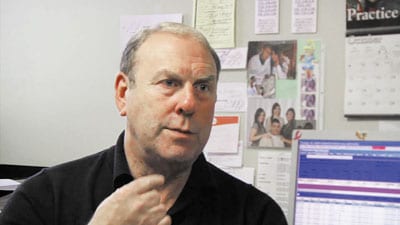Dr. Michael Gottlieb connected symptoms in gay men with a damaged immune system

Michael Gottlieb
DAVID TAFFET | Senior Staff Writer
When Dr. Michael Gottlieb was a 33-year-old assistant professor specializing in immunology at UCLA Medical Center in 1981, he learned of a gay man experiencing unexplained symptoms — fever, weight loss, thrush.
Thrush was usually associated with people with a damaged immune system, specifically damaged T-cells.
Working with a postdoctoral fellow, Gottlieb discovered that the patient’s T-cells with the CD4 surface marker were absent.
The patient was discharged from the hospital, but returned a week later with a type of pneumonia called Pneumocystis carinii, until then usually found in organ transplant patients.
Soon after, Gottlieb heard about a doctor with a large gay practice who had two patients with similar symptoms as well as cytomegalovirus or CMV, a common virus that can cause serious problems in someone with a compromised immune system, such as liver damage, loss of sight and hearing and more.
Gottlieb began seeing more related cases. Several developed Kaposi’s sarcoma, a rare skin cancer usually found in older men.
He published a detailed account of his findings in the New England Journal of Medicine. Because of the delay in publishing in the medical journal, the Journal of Medicine editor encouraged him to submit his findings to the Centers for Disease Control Morbidity and Mortality Weekly Report. While many doctors contributed to advances made in AIDS treatment and the discovery of the HIV virus, Gottlieb was the first to publish anything about this syndrome of ailments hitting gay men.
At first his report received little attention. Then another doctor reported 26 gay men with Kaposi’s sarcoma on the east and west coasts. A New York Times article in July 1981 on this “gay cancer” got national attention.
Gottlieb treated a growing number of AIDS patients through the 1980s, including actor Rock Hudson, and published 50 papers on the topic. At a time when no one was talking about the illness, Gottlieb spoke publicly about the epidemic.
In 1985, Gottlieb became the founding chairman of amFAR, the American Foundation for AIDS Research, along with Mathilde Krim.
Two years later, he was denied tenure at UCLA because of a fear by the university that his association with AIDS would scare patients away from the hospital’s growing and profitable transplant program. Gottlieb went into private practice instead.
On Dec. 1, World AIDS Day, Gottlieb will be the featured speaker at a C.U.R.E. and Health Services of North Texas program in Richardson.
Dale McEowen, medical case manager of the Plano office of Health Services of North Texas, said he was excited to hear Gottlieb.
“Our theme is reflections,” McEowen said. “He’ll talk about what we’ve learned over the years and what we’re still learning.”
“In addition to the traditional remembrance day, this year we’re focusing on family, friends and caregivers of people who died of HIV,” said C.U.R.E. founder
Rosann Rosetti of the event, which is open to the public. Portions of the AIDS Memorial Quilt will be on display, and Dallas performer Linzey Serrell will sing.
Noah’s Event Venue, 2251 N. Greenville Ave., Richardson at 6 p.m. on Dec. 1. Free.
This article appeared in the Dallas Voice print edition November 27 2015.


